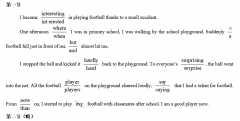陕西省西安市第一中学2014届高三上学期期中考试英语试题试卷(3)
41.A.when B.before C.until D.while
42.A.Largely B.Generally C.Gradually D.Probably
43.A.extra B.average C.total D.limited
44.A.repeatedly B.nearly C.immediately D.anxiously
45.A.According to B.In relation to C.In addition to D.Because of
第二部分 阅读理解 (共两节,满分40分)
第一节 (共15小题;每小题2分,满分30分)
阅读下列四篇短文,从每小题后所给的A,B,C,D四个选项中,选出最佳选项,并在答题卡上将该选项涂黑。
A
It was a village in India. The people were poor. However, they were not unhappy .After all , their forefathers had lived in the same way for centuries.
Then one day, some visitors from the city arrived. They told the villagers there were some people elsewhere who liked to eat frogs’ legs. However, they did not have enough frogs of their own , and so they wanted to buy frogs from other places.
This seemed like money for nothing .There were millions of frogs in the fields around, and they were no use to the villagers. All they had to do was catch them. Agreement was reached, and the children were sent into the fields to catch frogs. Every week a truck arrived to collect the catch and hand over the money. For the first time, the people were able to dream of a better future. But the dream didn’t last long.
The change was hardly noticed at first, but it seemed as if the crops were not doing so well. More worrying was that the children fell ill more often, and that there seemed to be more insects around lately.
The villagers decided that they couldn’t just wait to see the crops failing and the children getting weak. They would have to use the money earned to buy pesticides(杀虫剂) and medicines. Soon there was no money left.
Then the people realized what was happening. It was the frog. They hadn’t been useless. They had been doing an important job---eating insects. Now with so many frogs killed, the insects were increasing more rapidly. They were damaging the crops and spreading diseases.
Now, the people are still poor. But in the evenings they sit in the village square and listen to sounds of insects and frogs. These sounds of the night now have a much deeper meaning .
46. From Paragraph 1, we learn that the villagers __________.
A. worked very hard for centuries
B. dreamed of having a better life
C. were poor but somewhat content
D. lived a different life from their forefathers
47. Why did the villagers agree to sell frogs ?
A. The frogs were easy money
B. They needed money to buy medicine
C. They wanted to please the visitors
D. The frogs made too much noise
48. What might be the cause of the children’s sickness?
A. The crops didn’t do well B. There were too many insects
C. The visitors brought in diseases D. The pesticides were overused
49. What can we infer from the last sentence of the text ?
A. Happiness comes from peaceful life in the country
B. Health is more important than money
C. The harmony between man and nature is important
D. Good old days will never be forgotten
B
“Have a nice day” may be a pleasant gesture or a meaningless expression. When my friend Maxie says “Have a nice day” with a smile, I know she sincerely cares about what happens to me. I feel loved and secure since another person cares about me and wishes me well.
“Have a nice day. Next!” The version of the expression is spoken by a salesgirl at supermarket who is rushing me and my groceries out at the door. The words come out in the same tone ( 腔调 ) with a fixed procedure. They are spoken at me, not to me. Obviously, the concern for my day and everyone else’s is the management’s attempt to increase business.
The expression is one of those behaviors that help people get along with each other. Sometimes it indicates the end of a meeting. As soon as you hear it, you know the meeting is at an end. Sometimes the expression saves us when we don’t know what to say. “Oh, you just had a tooth out? I’m terribly sorry, but have a nice day.”
The expression can be pleasant. If a stranger says “Have a nice day” to you, you may find it heart-warming because someone you don’t know has tried to be nice to you.
Although the use of the expression is insincere, meaningless social custom at times, there is nothing wrong with the sentence except that it is a little uninteresting. The salesgirl, the waitress and the countless others who speak it without thinking may not really care about our day. But in a strange and comfortable way, it’s nice to know they care enough to pretend they care when they really don’t care all that much. While the expression may not often be sincere, it is always spoken. The point is that people say it all the time when they like.




